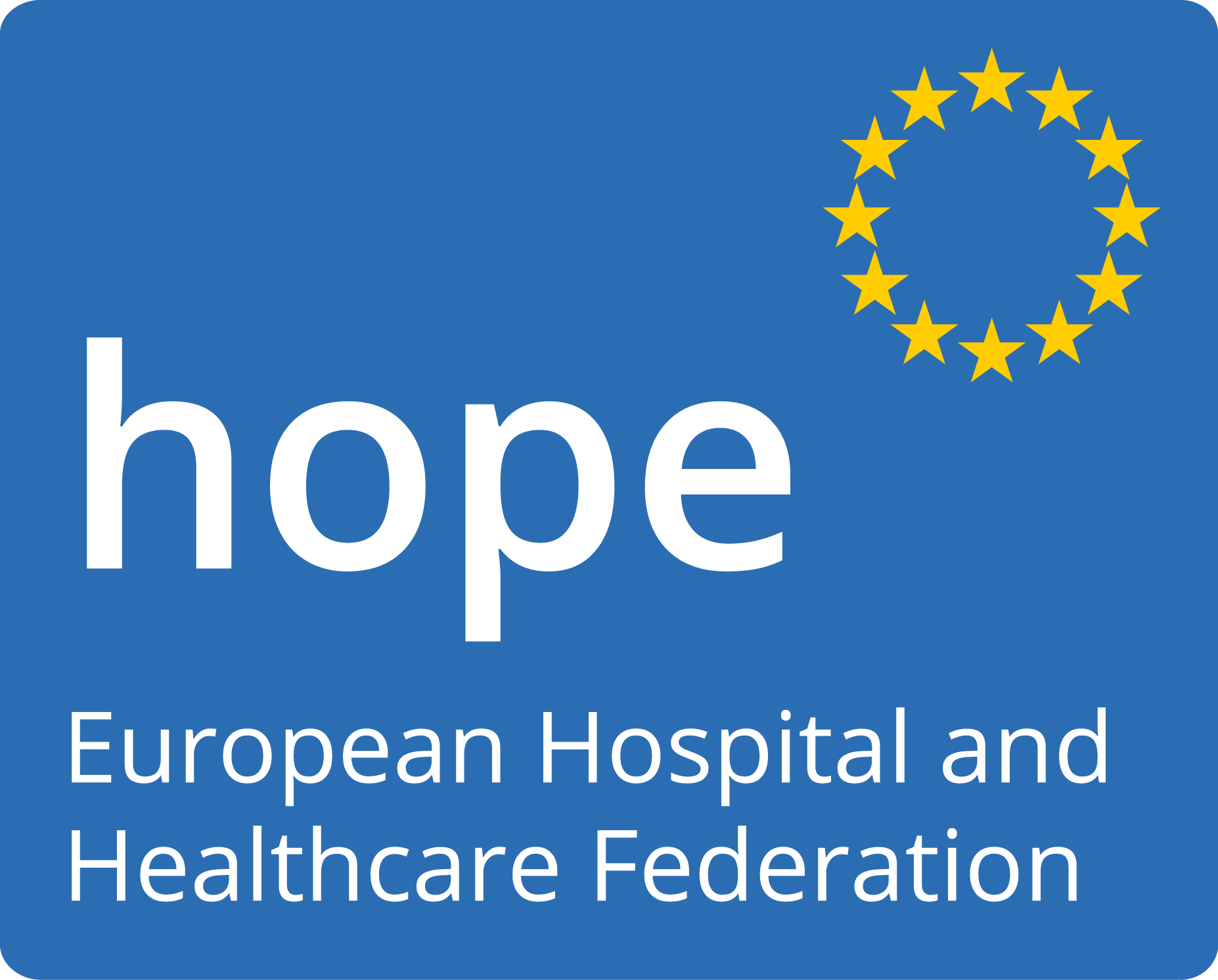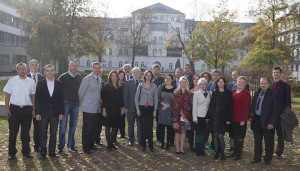
- This event has passed.
Quality assurance in German hospital care
30 October 2014 - 31 October 2014
The German Hospital Federation (DKG – Deutsche Krankenhausgesellschaft) organised the study visit “Quality assurance in German hospital care” on 30-31 October 2014 in Berlin. 25 participants coming from 12 EU Member States and Serbia were joining the workshop. Amongst them were representatives from ministries, from hospital organisations as well from hospitals, all being in charge of quality in health- and hospital care within their organisations.
Mr Marc Schreiner (Director EU-policies/international affairs) welcomed the participants in the premises of DKG’s headquarter and introduced the organisation as umbrella association of all German hospitals. DKG, despite being a private organisation, is mandated by law to contribute to the system of joint self-government in German healthcare, e.g. in the Federal Joint Committee, where binding quality indicators for hospital care are set up by service providers’ and health insurances’ organisations. He finally glanced at the running political debates and the growing idea to give “quality” a greater importance when planning and pricing hospital care.
Mrs Dr Doris Voit (policy officer in DKG’s “human resources management/hospital organisation” department) in her speech explained what DKG was undertaking as a federal organisation to promote quality in hospital care, highlighting the contribution to work done in the Federal Joint Committee in detail. She additionally gave an overview about all legal acts requiring efforts on quality assurance in healthcare. She then focused on patient safety and resumed all major national initiatives since 2003 describing actors, aims and outcomes. She also gave information on CIRS (critical incident reporting systems) and explained the role of clinical guidelines in German hospital care. She concluded by expecting a more cross-sectoral approach of quality assurance to come.
Mr Axel Mertens (also policy officer in DKG’s “human resources management/hospital organisation” department) added examples on DKG’s activities on quality assurance, e.g. the negotiation of quality indicators on structures and processes as well as caring for the financing of special measures and enabling of transparency by reporting requirements. He then focused on two areas of special expertise, like organ donation as the first example. He described the need for in house-coordinators and the procedural requirements for explantation, storage and transport of organs, reporting structures and needs as well as the introduction of minimum volumes. For the area of premature births he showed examples of minimum standards for staff and infrastructure, on minimum volumes as well as of reporting requirements. He ended by stating the central role of quality in hospital care which requires reliable financing crucially.
Dr Markus Wörz (desk officer in the department of quality assurance in healthcare and cross-sectoral health services of the Federal Joint Committee) extensively described the composition and working methods of the institution he is working for also explaining its tasks, like e.g. the setup of binding quality standards for service providers. He explained the legal basis of the institution’s mandate and the impact of its directives for quality assurance. Additionally he showed details of several of those directives, e.g. on paediatric cardiac surgery, minimum volume requirements or on chronic renal dialysis. But he showed also an example for a more general aspect a directive can imply, i.e. the directive for quality assurance across healthcare institutions and cross-sector. At the end of his presentation he pointed to the quality report of hospitals and the external quality assurance process as examples of the consequences of the Federal Joint Committee’s work and mentioned the official cooperation with the AQUA-institute as the executive body for the external quality assurance model.
Mrs Professor Dr Anke Bramesfeld presented AQUA-institute in which she is working, its tasks and working methods. She first told the history of her institute’s involvement in the process of external quality assurance since 2009 and the number of quality indicators being the basis of this process. She then explained the execution of the data gathering and evaluation process by the different players on federal and regional level as well as the single steps of the so called “structured dialogue” between representatives of the AQUA-institute and the hospital, in the case that the data on a quality indicator reported from the respective hospital does not match a predefined range of acceptable results. She finally gave examples of the outcomes and statistics of the external quality assurance process. She additionally described the methodology for the development of new indicators with its different steps of identification of gaps, involvement of experts and its final approving of the indicators by the members of the Federal Joint committee. She also shared her expectation for the future including a stronger cross-sectional approach for quality assurance, a widened scope of use of the data gathered in this process and the development of a comparative public reporting. She summed up by clarifying that this special quality assurance process can deliver transparency but not overcome quality problems.
Dr Wulf-Dietrich Leber as the Director of the division “hospitals” of the Federal Association of Statutory Health Insurance Funds (SHI funds) at the beginning of his presentation gave an overview about his organisation and linked to the topic of the seminar by describing the effects of the introduction of the DRG-system (diagnoses related groups) as the basis for hospital financing, leading to more transparency of and competition by quality of healthcare in hospitals. He added that the billing rules also could provide incentives for better quality in care, too. He then referred to the external quality assurance process triggered by the Federal Joint Committee and concluded, that the achieved high level of transparency for the available indicators and the quality reports of hospitals does not deprive from the need to create more reliable transparency, e.g. by including other healthcare sectors. He ended by advocating for a stronger role of minimum volumes for healthcare services or for “pay for performance” as another steering tools for more quality as a political perspective of the SHI funds.
At the beginning of the second day, Dr Henrik Herrmann as a medical visitor of KTQ (“Cooperation for transparency and quality”) described the organisational structures and the composition of owners of KTQ, amongst the DKG, SHI Funds, German Medical Association and the Nursing Council. He explained the concept of the voluntary accreditation especially on the quality management of hospitals as a consensual dialogue at eye level. He described the accreditation process itself, including a self-assessment of a hospital alongside the KTQ-catalogue as a first step to be followed by an external assessment and an onsite-visit by KTQ-visitors, finishing with the publication of the KTQ-quality report and the awarding of a certificate. He continued describing the different assessment categories, e.g. quality management with its examination system “pdca” (plan, do, check, act). He pointed out, that the KTQ-certificate has duration of three years only with the chance of recertification. He ended by showing examples of KTQ’s international experiences with accreditation of hospitals in China.
Mr Christian Lautner as the CEO of “qualitätskliniken.de” presented his company and its “five dimensions of quality”, being the basis for the transparency register with its almost 300 participating hospitals all over Germany and across all kinds of ownership. He explained details on the questionnaires on outcome quality, patients’ safety and satisfaction, physicians’ satisfaction as well on ethics which all have to be filled out by patients and service providers. He continued explaining that the answers are enabling rankings of hospitals and concrete search tools for the users of the website qualitätskliniken.de with its already more than 500.000 visitors yearly since its creation in June 2010. Hospitals could benefit from the assessment by gaining another tool of presentation and by – on the occasion of the evaluation – getting a push for hospital internal discussions on quality improvement. The process would also enable the management of a hospital to have an additional controlling tool based on measurable quality indicators.
After these presentations, the participants were carried to the military hospital and welcomed by Colonel MD Dr Christian Zechel as the deputy hospital director and head of quality management. After an introduction to the history, mandate and current state of the hospital he showed different examples of quality assurance in the local organisation of this hospital, e.g. an integrated it-system enabling access to patient files across the different departments and showing compliance with quality management requirements. He ended his presentation by giving some examples of certifications and accreditations of different departments. Participants afterwards were shown around to decorated wards, e.g. the “wound centre” which received a certificate “wound centre, dermatology, vascular surgery and trauma surgery” in September 2014 only, being the third hospital in Germany awarded. The visit ended at the rescue services centre of the hospital which also is certified and running the most modern models of rescue cars.
Presentations
Mr Marc Schreiner – Quality assurance in German hospital care
Mrs Dr Doris Voit – Patient Safety in Germany from the hospital perspective
Mr Axel Mertens – Quality of medical treatment
Dr Markus Wörz – The Federal Joint Committee (G-BA) and Quality Assurance in Health Care
Mrs Professor Dr Anke Bramesfeld – Mandatory Quality Assurance in the German Health Care System
Dr Henrik Herrmann – KTQ-GmbH – Cooperation for Transparency and Quality in Healthcare

